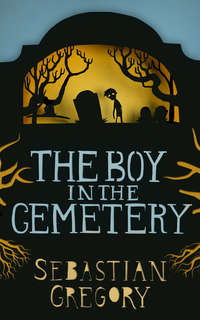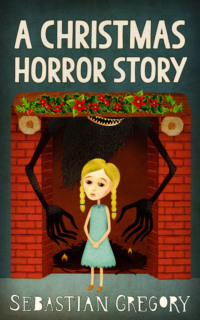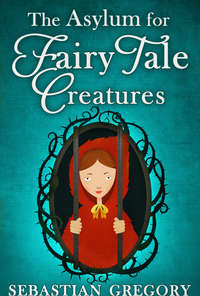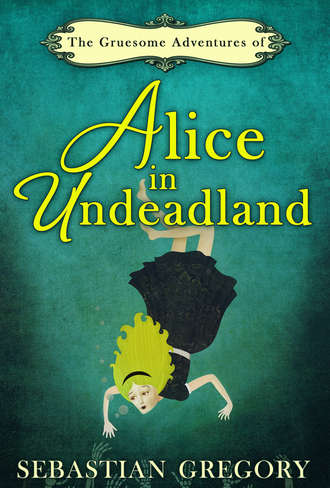
Полная версия
The Gruesome Adventures Of Alice In Undeadland

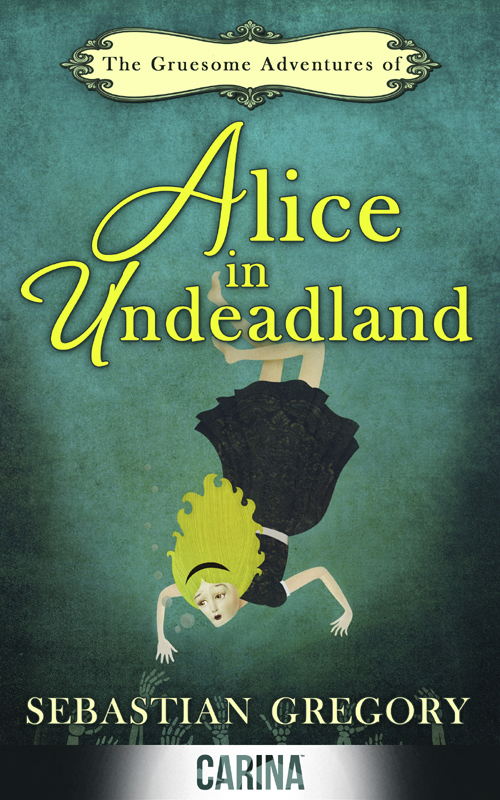
What once was curious is now dead…
Shortly after her thirteenth birthday, unhappy orphan Alice takes a tumble —- off a bridge, and into the Thames. But it seems that her misfortune has only just begun. Because where once was a Wonderland, is now a festering world of the unwanted dead.
Accompanied by a mouse- head bottle -top, Alice braves Undeadland, encountering as she does so the Mad Undertaker, the Knave of Broken Hearts, and the dreaded Queen of the Kingdom of Rot. As events take curiouser and curiouser turns, things look bleak for Alice. Will she ever find her way back to the land of the living?
The Gruesome Adventures of Alice in Undeadland
Sebastian Gregory

www.CarinaUK.com
Sebastian Gregory (pronounced Gre-gory) writes from a cabin in the middle of a haunted wood. His inspiration comes from the strange and sorrowful whispers amongst the ghastly-looking trees. Sebastian is only permitted to leave the shadowy candlelight of the cabin once a story is complete, where it is unleashed upon the world of the living. Sebastian writes for the younger readers as they are easier to terrify than adults whose imaginations died long ago.
When not writing in a cabin in the middle of a haunted wood, Sebastian lives in Manchester with his family and various animals.
You can email Sebastian on writtenseb@hotmail.co.uk; he would love your feedback.
You can follow him on Twitter @wordsbyseb
Thank you to my family, who listened to my insanity and only occasionally rolled their eyes.
A special mention to Lewis Carroll, whom I spoke to extensively while writing this book.
Contents
Cover
Blurb
Title Page
Author Bio
Dedication
Chapter One
Chapter Two
Chapter Three
Chapter Four
Chapter Five
Chapter Six
Chapter Seven
Chapter Eight
Chapter Nine
Chapter Ten
Chapter Eleven
Chapter Twelve
Chapter Thirteen
Chapter Fourteen
Epilogue
Extract
Endpages
Copyright
Chapter One
For most of her short life Alice had lived in an orphanage after her parents had succumbed to cholera. It was an unhappy place run by a cruel and crone-like mistress who wore ill-fitting black lace over old pale skin the colour of tripe. Her wrinkled face was coated in a thick powder and globs of red lipstick. She closely resembled an undernourished vampire” The mistress would dream up unusual and impossible chores for the children to undertake. Her favourite was having the orphans knit spider webs into scarves.
The trick was to catch the spiders first, a task not suited to children. The spiders were vicious and as Alice and the other orphans entered the dust-covered arachnid room the spiders would descend, biting, pinching, crawling in the girls’ hair, ears, under their rags and over their skin.
“Help me, Alice,” screeched Dinah, one of the smallest and youngest orphans, who Alice shared a close bond with. Being barely six years old, Dinah found life particularly hard in the orphanage and Alice had helped her through the trials of being there.
Alice shielded Dinah under her arms and sat her down. Around them other girls were in floods of tears and panic.
“Don’t fret, Dinah.” Alice smiled and held her hand; a fat, juicy spider climbed over tiny fingers trailing webs and spots of blood where the spider bit.
“Think of nicer days,” Alice explained. “I think of my parents and seeing their smiles.”
When the young ladies of “Miss Scrim’s Orphanage for Burdens” were unable to complete their tasks, the mistress created even more unusual punishments. Such as standing for hours — bare footed — in the leech bowl.
Miss Scrim had the girls in a line as she paraded in front of them.
“You,” creaked the mistress, pointing a finger that was more bone than anything towards the tiny Dinah. The other orphans sighed with a mixture of relief and terror at what was happening and what would happen next.
“You didn’t work as hard as you should. You must earn your keep if I am to keep a roof over your miserable head.”
“Please, miss,” she whimpered.
“To the leeches with you,” Miss Scrim hissed.
Dinah took a shuddering step forward before Alice caught her shoulder.
“Mistress.” Alice spoke. “It was I who didn’t work hard. I am sorry — Dinah was helping me,” she lied.
The mistress sneered and thought for a moment. “Then you feed my pets tonight,” she decided.
Alice stood in front of the bowl at her feet; the bloated leeches squirmed in anticipation. Alice placed her feet in one after the other. The feeling of the slime-riddled creatures feeding between her toes was not unlike putting one’s feet in a bowl of jelly laced with sewing needles. Once again Alice thought of her parents and let her mind wander to their arms.
Toys were prohibited at the orphanage; playtime was time away from work time, considered Miss Scrim. So the children made do with what they could, making themselves teddy bears of coal or dolls from nettles, sticks and mud. The girls of the orphanage slept in the damp and infested cellar. While in the lodgings above, Miss Scrim rented the rooms to unsavoury characters, leaving the orphans to huddle together in the dark. They slept amongst scraps with always one eye to the shadowy corners. Things of many limbs, things of many eyes crawled in those corners. There were stories of children sinking into the shadows. Upon the stone floor tiny nail marks were dragged and etched along.
“Where is Dinah?” Alice asked one evening. She had not seen her all day.
There was a moment’s silence before the reply came.
“Mistress sold her to a chimney sweep. Except…”
“Except what?” Alice asked.
“Except I saw the sweep come back demanding his money. He was mad at Dinah. He said she ruined a toff’s chimney with her corpse.”
So it was that sometime after her uncelebrated thirteenth birthday Alice decided to jump into the River Thames and forever end her misery. To that end, one freezing night Alice climbed from the cellar’s small window and made her way through gaslit cobbled streets to Tower Bridge. Horrible black steaming creatures snorted, pulling carriages as she passed by. No one paid her attention, except to sneer or stare with an unhealthy purpose. There were plenty of children on London’s streets and so another urchin in the night was paid little heed. She kept to the dark shades of London and her head to the street. Eventually after the dark walk through London’s slums, Alice stood on the bridge staring into the water. The wind was cutting and blew her long blonde hair with the sharpest of strokes. Alice looked out from the bridge; London was lit by a thousand dull lights. It reminded Alice of a demented beast.
To calm her nerves she sang a song under its gaze:
‘I often wondered what it would be like to die,
To jump into the river and sink deep inside,
Drink in the water and fill my lungs a while,
Floating along with a contented dead smile.
Did the dead sleep for ever so they could dream?
How I would dream such things, floating in that stream.’
Alice closed her eyes to the world, held her hands out and felt the edge of the bridge beneath her feet. She thought of her parents and how they had all loved each other. She thought of the orphanage and how love avoided the place. She wondered how much loss and heartbreak she could endure, was there ever to be an end. Her short life had been hard and tinged with sadness; however she had the comfort in memories of her parents. There were children living amongst the gutters who had never known their own parents at all. Yet here she was, still managing to live when others had not been so fortunate. There was something in those thoughts that calmed her and suddenly, with determination, she knew not to let adversity define her. She never had and even now at her lowest moment, she would not.
Feeling foolish at her plan, Alice began to climb from the edge of the bridge when a policeman, seeing the danger, ran towards her calling out, “Girl, girl, get down!” Alice, startled, turned to explain before slipping and plunging like a dead seagull into the waiting water. The frozen cold took her breath and the water rushed into the gap left in her lungs. She was welcomed to the oppressive water as her dress became as heavy as lead. Although Alice had no longer the intention of drowning, she did anyway.
Chapter Two
Alice found death to be quite troublesome. So she decided not to do it any more. When she opened her eyes again, she found the stars staring back at her. Was this the afterlife? If so it had dampness to it. Alice realised she had been carried by the water and abandoned upon the muddy riverbank. Soaking wet and covered in thick mud, Alice lay in the silt and pondered. She should have been panicked at her ordeal but Alice was no longer breathing. Her chest simply refused to gasp for air. Water dripped from her mouth as if she were an overflowing cup of tea. A way along the river she could see the distant silhouette of Tower Bridge. There were police whistles demanding attention. The lights of London’s eyes continued to watch her from all around the Thames.
It was then she noticed the rabbit sitting on her chest. The rabbit was dirty, white and tatty. A wretched thing with broken ears and a missing left eye. Curiously its mouth was covered by a surgeon’s mask. Confused by this, Alice noticed the rabbit’s paws. In one it held a blooded scalpel, in its other a human heart, still dripping. She held her hand to where her terrified heart should have been pumping; except it was now an empty wound.
The rabbit placed her heart into a tiny knapsack tied around its waist. It leapt from Alice and over to a sewer pipe jutting from the bank, spilling London’s filth into the river. Underneath, the rabbit was covered in muck, crawling and struggling upwards. As it made its way to the pipe the spilling sewage washed it back down into the mud.
“That’s my heart,” shouted Alice as she waddled over, heavy and sloshing with water.
She managed to pick the rabbit up in both hands; it looked like a stuffed toy, yet had the feel of bone wrapped in wet rags. The rabbit immediately screeched a horrible sound when Alice lifted it from the mud. It tore away its mask and sank sharp teeth deep into Alice’s left hand. There was no pain but Alice shook the creature this way and that. The rabbit refused to let go, so she had no choice but to smash its head against the pipe. The rabbit spun from Alice’s hand and disappeared into the darkness of the sewer.
“Well, I never,” gasped Alice. She held her bitten hand to her eyes.
Two fingers were now missing. Strange, thought Alice, as to why there was no blood. The skin and stumps were a pale greenish. She tore a piece of material from her dress and wrapped the makeshift bandage over her wound.
Alice’s mother had always taught her to keep her most precious emotions in her heart. Alice remembered her mother holding and stroking her hair. She ran her finger over her chest bone, making the shape of a love heart. Having the organ stolen was akin to having the love she held for her departed parents taken away. Alice searched herself for any feelings, only to find she had none. Death had hollowed her. This would not do at all; Alice had no choice but to follow the rabbit.
The rusted pipe, although tiny in comparison to Alice, would still be able to accommodate her if she crawled on her stomach. She waited until her eyes had adjusted to the dark and her nose to the stench before using the bank to climb into the pipe. There was a lining of soft debris and a kind of slime not unlike that of slugs, so Alice slid along at a pace.
This isn’t so dreadful, thought Alice.
The running water washed away most of the mud and the rats that ran along seemed friendly enough, only occasionally stopping to nibble at her legs. However the rabbit was nowhere to be seen, but Alice could hear screeching further along. She believed herself to be getting closer to her quarry when all of a sudden the pipe took an impossibly sharp dip, sending Alice sliding down, sprawling.
Chapter Three
Alice fell into limbo. How long ago had she done so? She couldn’t guess as no time had fallen with her. Even the sensation of dropping was very mild with only the slightest flutter of Alice’s dress and the awkward position of her legs indicating her journey downward. It was as such that Alice’s mind began to wander and she was wondering if anyone would be searching for her when suddenly the strangest of events occurred. Memories began to play out around her and scenes from her previous life appeared.
She saw herself as a five-year-old, all smiles and long blonde hair and pretty blue dress; she was showing her father a picture she had drawn. Alice’s father was smiling, and put his stethoscope around Alice’s neck, before grabbing her, smothering her in cuddles. The play disappeared as if made from wisps of smoke and was replaced by another.
It was her mother: Alice sat on her knee; her mother, kindly and beautiful, read from a book of rhymes. Alice knew exactly which one. She mouthed it along with her mother:
The queen of hearts,
Stole body parts,
From the cemetery one day.
The queen of hearts did sew those parts,
To keep herself ageing away.
Then tragedy forced itself before Alice. A scene she would never wish to see again but so strong she couldn’t help but watch. Her poor mother and father were in the parlour, seemingly asleep in their coffins. Alice’s father, the most generous doctor anyone had known, treated many of the very sick and poor. His kindness, however, fate repaid with pain and let cholera follow him home.
Chapter Four
There was a crash.
Then rolling.
Into what felt like dried sticks and dead leaves.
They pierced and tore through Alice’s skin. They snapped and crunched as Alice tumbled down a steep slope. Head over heels and head again. She rolled into a final and untidy heap. Alice lay there just to make sure she had stopped moving. She righted herself and wiped away the hair that covered her eyes. The crunching sound did not belong to twigs but in fact heaps upon heaps of pure white bones. She sat upon them, tiny skeletons and skulls of birds, mice, rats, shrews and even fish. They cracked horribly as she shifted. All around her were hills of bones, going on far into the distance. They were lit by flickering yellow gas lamps that hung in the air of their own accord, casting a wax light while eerily floating. Where Alice should have had revulsion at the bleached heaps, she had only indifference.
Alice tried to stand; however, her legs were misplaced. She felt around for them only to discover her arms were the wrong way around, elbows forward. She turned her head and realised that, while her body was sitting upright, it was her head that had snapped backwards from the landing. She thought for a moment before taking hold of her head and turning it as hard as she could. With a sickly creak it twisted back into place. Unfortunately she had twisted her head further the wrong way around, winding it tighter instead. The result was now her neck resembled a fleshy spring.
Alice began to climb the bone hill slowly as it shifted with each step; it was like climbing a mountain of pebbles. At times, the bones became so steep and brittle that Alice had to manage on all fours. She tumbled on a couple of occasions but failed to give in as the bones rattled and poured. Finally Alice reached the summit with sharper, tiny shards sticking themselves in her arms and knees. At the plateau’s summit stood a small iron table. It glittered with a black metal and was patterned by demons on the legs and rim of the table itself. A tiny clear vial containing a green liquid sat on the table. The vial had a head of a field mouse as a bottle top. Around the bottle neck tied with string, a label read Drink Me.
Unsure how to respond to the bottle, Alice decided to give the liquid closer investigation. She twirled the mouse lid easily but it squeaked painfully with each twist. Alice shuddered with the squeaking until the lid was free. There was something sad about the mouse-head bottle top. She placed it in her dress pocket.
“Drink me,” she whispered to herself.
Alice lifted the vial an inch from her lips before she could smell the contents. They smelt of death and rot and poison. Despite the label, this was not for drinking. As Alice poured the foul green liquid it hissed and bubbled and congealed over the bones. Immediately the huge pile shifted, toppling the table into the darkness and bringing Alice to her knees. With a terrible rattle, the hill of bones began to collapse as the liquid burned its way through. Unable to free herself, Alice was pulled along like coal pouring down a shoot. Buried under the bones it felt like drowning all over again — impossible as Alice knew she was dead. True, not fully dead, but a disconcerting sensation none the less. Then with a huge sound not unlike a jar of marbles smashing it was over. Alice found herself sitting in dirt, bones strewn in small piles around her.
“Now where has this taken me?” Alice asked, standing, dusting herself, shaking tiny skeletons from her hair and pulling them from her arms and knees. The sky was a pallet of deep grey. There were no stars, only clouds resembling bloated maggots slowly floating on an invisible breeze. Below, the landscape was a garden of dead weeds painted in shadow and awash with grey. As far as Alice could see, row upon row of gravestones, bent, broken in silhouette. It was as if evil had stolen the entirety of colour from the world.
“Just where am I?” she asked herself.
“Undeadland,” came a squeaking from Alice’s dress pocket.
Alice peered in her pocket and produced the mouse-head bottle top. She regarded it this way and that; the mouse head was exactly like the tiny stuffed creatures Alice had seen in a museum, sad and still and left to collect dust.
“What is Undeadland?” Alice asked.
When the mouse head spoke there was no movement, just a voice that suited the mouse well.
“This is Undeadland, where the unwanted dead go.”
“Can the dead be unwanted?” Alice wondered.
“Of course,” the mouse head explained. “Otherwise there wouldn’t be an Undeadland.”
This slightly annoyed Alice, being argued with a kind of logic that made no sense.
“You seem to know a lot for a bottle top.”
The mouse’s tone became less shrill and more sombre.
“Alas, I was not always so. Once I lived on a farm with many brothers and sisters, all running, nibbling and having fun as mice should. That was until the farm cat caught me unawares and made a present of my head to the farmer.”
“Oh,” Alice replied. “In that case I’m sorry to hear that. How did you come to be here?” she added.
“I spent a while longer on the shelf of the farmer’s wife stuffed in a bottle, watching the fat cat enjoy life, then one day the farmer tripped, knocking my bottle off the shelf. I landed right on that cat’s head, killing the monster instantly but shattering my bottle. The next thing I knew I was here.”
For the moment there was only quiet, save a grim wind blowing through the gravestones. The mouse coughed, murdering the silence.
“If you are not unwanted dead why are you here?”
“A white rabbit cut out and stole my heart. I followed it here.”
“Do you need your heart?”
“It is where I keep my love for my parents. It is the only thing I have left of them,” she explained further.
“I see,” replied the mouse head. “Perhaps I could help? I could be your guide and in return you could keep me safe? After all, I am a mouse bottle top without a bottle — we have both lost things.”
Alice thought for moment. The mouse head seemed pleasant enough and she had no clue to the rabbit’s whereabouts. The company would also not go unwanted.
“In that case,” she said, “I will keep you safe.”
“Oh, thank you. I won’t let you down, miss.” The mouse head was elated.
“Please, call me Alice.”
She fashioned a necklace from pieces of her dress with the mouse head as makeshift locket. She tied it around her neck. Into Undeadland she went, with Mousehead — the name she had chosen — as her companion. They walked amongst the gravestones, stopping occasionally to read the grim epitaphs from the many grim headstones.
Little Billy Brat swallowed a rat — it scratched through his throat, said one, and there in the stone was a carving of a boy cowering in fear, while a giant rodent slobbered above him.
Mary Mary dead and scary, said another and again in stone was a ghost child rising from a mirror held by a smaller little girl.
Victor Drake squeezed to death by a snake.
Henrietta Cripps impaled with sharpened sticks.
Little Bo Peep trampled by rabid sheep.
And so it went on. It reminded Alice of a story the children of the orphanage would tell each other. It was a way of finding comfort in the pain of others. She spoke it out to Mousehead.
“‘Ten Victorian children playing amongst a long-lost shrine,
One disturbs the cursed seal,
Then they are nine.
Nine Victorian children bind a friend with weight,
They throw him into the murky pond,
Then they are eight.
Eight Victorian children pray to their two friends in heaven,
Конец ознакомительного фрагмента.
Текст предоставлен ООО «ЛитРес».
Прочитайте эту книгу целиком, купив полную легальную версию на ЛитРес.
Безопасно оплатить книгу можно банковской картой Visa, MasterCard, Maestro, со счета мобильного телефона, с платежного терминала, в салоне МТС или Связной, через PayPal, WebMoney, Яндекс.Деньги, QIWI Кошелек, бонусными картами или другим удобным Вам способом.



